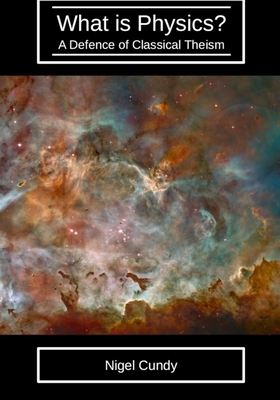What is Physics?: A defence of classical theism

What is Physics?: A defence of classical theism
The modern world-view is very much shaped by the scientific revolution of the sixteenth to nineteenth centuries. However, the science behind Newtonian-based physics, and its daughters, has been shown to be wrong. Almost every philosophical assumption behind the mechanistic philosophy that inspired Galileo, Newton and their successors through to Maxwell, and even Einstein's classical theory of relativity, has been shown to be wrong by the experimental success of quantum field theory in the latter part of the twentieth and early twenty first centuries. Key philosophical principles, which underlie much of contemporary thought, such as nominalism, empiricism, determinism and the enlightenment views on causality are also undermined. The scientific revolution was accompanied by an unremitting criticism of classical philosophy. However, much of that criticism was based on the premise that physics is fundamentally mechanistic, an assumption we now know to be incorrect. So how well does that criticism measure up against today's science? The critical arguments are far weaker than they are often claimed to be. So what if we compare contemporary physics against classical philosophy? Classical philosophy is not unscathed, but it survives the encounter. Key classical concepts such as formal and final causality, potentiality and actuality, and the principle of (classical) causality have (when not misunderstood as the renaissance and early modern thinkers tended to do) direct analogues in quantum field theory. While it requires modification, and needs to be given a secure mathematical and geometrical foundation, the philosophy of the high medieval scholastics provides a far better basis for a philosophy of quantum physics than the various modern philosophies. The medieval philosophers showed rigorously that the premises behind classical philosophy logically imply classical monotheism. So how well do those arguments stand up when compared against modern physics, and how successful are the modern objections to those arguments? Again, the classical philosophers fare better than their later critics. For example, much of the modern criticism of the classical arguments attacks the form of causality used by the Greek, Islamic and medieval European philosophers. In the light of the mechanistic pre-twentieth century physics, such attacks seemed plausible, and were used to avoid the force of the medieval arguments. But quantum indeterminacy undermines the alternative enlightenm
PRP: 317.52 Lei
Acesta este Prețul Recomandat de Producător. Prețul de vânzare al produsului este afișat mai jos.
254.02Lei
254.02Lei
317.52 LeiLivrare in 2-4 saptamani
Descrierea produsului
The modern world-view is very much shaped by the scientific revolution of the sixteenth to nineteenth centuries. However, the science behind Newtonian-based physics, and its daughters, has been shown to be wrong. Almost every philosophical assumption behind the mechanistic philosophy that inspired Galileo, Newton and their successors through to Maxwell, and even Einstein's classical theory of relativity, has been shown to be wrong by the experimental success of quantum field theory in the latter part of the twentieth and early twenty first centuries. Key philosophical principles, which underlie much of contemporary thought, such as nominalism, empiricism, determinism and the enlightenment views on causality are also undermined. The scientific revolution was accompanied by an unremitting criticism of classical philosophy. However, much of that criticism was based on the premise that physics is fundamentally mechanistic, an assumption we now know to be incorrect. So how well does that criticism measure up against today's science? The critical arguments are far weaker than they are often claimed to be. So what if we compare contemporary physics against classical philosophy? Classical philosophy is not unscathed, but it survives the encounter. Key classical concepts such as formal and final causality, potentiality and actuality, and the principle of (classical) causality have (when not misunderstood as the renaissance and early modern thinkers tended to do) direct analogues in quantum field theory. While it requires modification, and needs to be given a secure mathematical and geometrical foundation, the philosophy of the high medieval scholastics provides a far better basis for a philosophy of quantum physics than the various modern philosophies. The medieval philosophers showed rigorously that the premises behind classical philosophy logically imply classical monotheism. So how well do those arguments stand up when compared against modern physics, and how successful are the modern objections to those arguments? Again, the classical philosophers fare better than their later critics. For example, much of the modern criticism of the classical arguments attacks the form of causality used by the Greek, Islamic and medieval European philosophers. In the light of the mechanistic pre-twentieth century physics, such attacks seemed plausible, and were used to avoid the force of the medieval arguments. But quantum indeterminacy undermines the alternative enlightenm
Detaliile produsului










